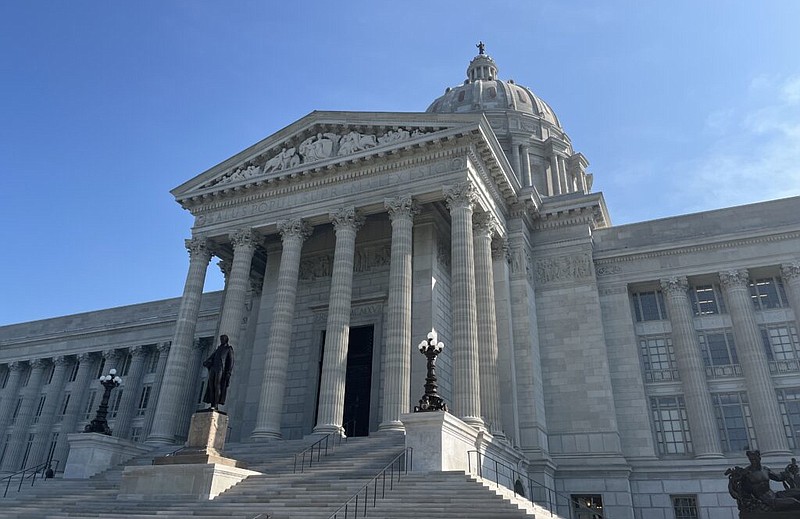Legislative budget negotiations hit an impasse as Friday's constitutional deadline approached, with Missouri House leadership demanding the Senate pass a massive tax cut in exchange for agreeing to fund improvements on Interstate 70.
Formal negotiating sessions were delayed three times as House Budget Committee Chairman Cody Smith and Senate Appropriations Committee Chairman Lincoln Hough worked to reach preliminary agreements on differences between the chambers.
The latest delay in the formal meeting came late Tuesday, when Hough refused to endorse a plan to cut corporate and personal income taxes demanded by House leadership, sources close to the talks told the Independent.
House Speaker Dean Plocher, who has made tax cuts a session-long priority, met with Hough on Wednesday morning. Plocher declined to comment on his discussion with Hough as he returned to his office to have a private meeting with Smith.
Shortly thereafter, the formal conference committee meeting, first set for Tuesday, then for 8 a.m. and again for 11 a.m. Wednesday, was rescheduled to begin at 4 p.m.
Sources said the impasse was broken by the House leadership accepting that the Senate would not pass the massive tax cut it wants.
The House in late March approved a $45.6 billion operating budget for the coming fiscal year, $2.1 billion less than proposed by Gov. Mike Parson in January. One big item that didn't make that plan was Parson's proposal to spend $859 million widening portions of I-70, but it was included in the separate $2.3 billion construction budget.
Hough restored the money in the $49.9 billion operating budget approved in the Senate and increased it to $2.8 billion, half from borrowed money, to widen the highway across the state.
The House-passed construction budget, however, hasn't received a required Senate hearing to get it to the floor for consideration. If the Senate makes major changes, time to negotiate differences is growing short.
Lawmakers must finish work on all spending bills by 6 p.m. Friday. If they fail to do so, they must return for a special session to complete appropriations before the fiscal year begins July 1.
There have been two years -- 1997 and 2003 -- when lawmakers met in special session to consider appropriations. In 1997, the General Assembly failed to pass all the bills, while in 2003, then-Gov. Bob Holden vetoed appropriation bills that he determined had left departments underfunded.
The state is in the best financial shape ever. Parson's budget projects a general revenue surplus of almost $5 billion on June 30. That estimate was based on a sharp decline in revenue growth that has not fully materialized and current growth rates would add more than $1 billion to the surplus if sustained to the end of the fiscal year.
Plocher pointed to that surplus in January when he outlined plans for additional tax cuts. In response, the House has passed cuts in personal and corporate income taxes, most recently Monday.
That bill, which passed the Senate as an exemption for Social Security benefits and payments from public pension programs with a $318 million annual cost, ballooned to more than $2 billion as every tax cut that had previously passed the House was piled onto the legislation.
The tax cuts included in the bill passed Monday include:
An increase in the property tax credit for low-income senior citizens and people with disabilities. The changes would increase the income cutoff and the amount of the credit against state income taxes for local property taxes. The changes would reduce state revenue by $80 million to $106 million annually.
A cut in the corporate income tax rate, currently 4 percent, to 2 percent immediately, with additional cuts triggered by growth in revenue from the tax. The corporate income tax produced $909 million of the $12.8 billion in general revenue during the last fiscal year.
A reduction in the top personal income tax rate, currently 4.95 percent, to 4.5 percent, with additional cuts triggered by revenue growth. The cut would reduce revenue by $343 million more each year than tax cuts currently scheduled for coming years.
An overhaul of the way personal property taxes are calculated. Instead of using dealer estimates of current value, the change would tax cars and tractors based on a percentage of the original price, with only a residual value remaining after 10 years. Local governments estimate they would lose up to $628 million in revenue annually by 2028.
The bill would also allow local property tax credits for senior citizens, exempt materials purchased by utility companies to produce electricity from sales tax and the dog tax, passed in 1921 and rarely paid, that imposes a $1 annual tax on male and spayed female dogs and $3 on unspayed females.
Hough has balked at supporting a large tax increase this year because the income tax cut he sponsored in last year's special session has not been fully implemented. That bill set the tax rate for this year at 4.95 percent, instead of the 5.2 percent in prior law, with additional cuts that would take the rate to 4.5 percent in four steps.
"It's not like we didn't just cut taxes," Hough said in a March interview. "We're not a high tax state. Corporate income taxes in this state are the second lowest in the country."
The Missouri Independent, www.missouriindependent.com, is a nonprofit, nonpartisan news organization covering state government and its impact on Missourians.

